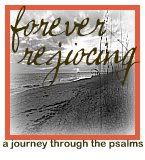Psalm 18 continued
* Pray. Ask God to give you an open heart and mind to learn new truths from His Word. Read Psalm 18 through three times. Record any thoughts or questions you have in your journal. If a verse stands out to you, write it on an index card and begin committing it to memory.
A few weeks ago we began looking at Psalm 18. This psalm is a song of thanksgiving and praise to God for the many times God had delivered David from his enemy. David desired always to keep these memories fresh in his mind and to speak of them often. It was his passion to share with others what God had rescued him from. Psalm 18 is a beautiful Psalm full of poetry and imagery of a God who fights for and protects His people.
We started out by looking at the first six verses of this Psalm. In verses one, two, and three David is praising the Lord because He had heard his cries and rescued him. Verses four through six tell us that God had rescued David from the chains of the enemy. Last week as we dug into verses seven through nineteen, I posed the question to you “does prayer matter?” We saw in Scripture how prayer moved earth and heaven, and raised storms to overthrow in a moment the enemies of God's people. Things were bad for David before he prayed, but they were much worse for his enemies as soon as his petition had gone up to heaven.
Did prayer make a difference in David’s life? Does prayer matter to us today? ABSOLUTELY! A trustful heart, by calling upon the divine aid of the Almighty God, turns the tables on its enemies. Prayer moves God and when God moves not only do the mountains quake, the enemy flees.
Today we will spend our time together digging into verses twenty through twenty-eight of Psalm 18. Here’s today’s question~ Is it wrong, prideful, or boastful to be proud of who we are and what we are doing? Are you ready? Let’s dig in.
Verse 20- “The Lord rewarded me according to my righteousness.” If we look at this Psalm as prophetical of the coming Messiah, these strong claims to righteousness are easily understood, because the garments of the Lord were and are white as snow; but to look at this as David proclaiming himself to be righteous has lead some to think of David as arrogant and boastful. Yet, if we look at this text for exactly what it is and not make a “mountain out of a mole hill”, there will be no difficulty in seeing its true meaning. Stay with me here, we’re going to dig down rather deep today. God’s grace and His gift of righteousness have been freely given to us and are in no way dependent upon anything we have done or ever will do. Through the blood of Jesus Christ, we have been clothed with the garments of grace and righteousness and we wear them not to boast in ourselves, but to boast in what the Lord God Almighty has done for us. Because we have been marked with this gift of righteousness we belong to the Lord, and as His rule of justice, He will avenge and protect His people. David's early troubles began with the persecutions of King Saul who no doubt did not have a relationship with the Lord. His envy and hatred of David resulted from the mere fact that David had been clothed with the righteousness of God’s grace and had chosen to wear that proudly as a man after God’s own heart.
Before God, David, the man after God's own heart, was a humble sinner, but before his enemies he could proudly proclaim that he had been “rewarded according to the cleanness of my hands” and the righteousness of his life. There is no self-righteousness or arrogance in an honest man knowing that he is honest, nor even in his believing that God rewards him through divine intervention because of his honesty. Within the Kingdom of heaven, grace reigns supreme. The cleanness of David’s was a result of the grace and mercy the Lord bestowed upon him. David was well aware of the fact that without God, he was nothing. David could maintain his integrity and with much passion and conviction defend his character because he knew that he was in right standing with the Lord.
Verse 21- In this verse we see the purity of David’s heart. He has “kept the ways of the Lord” and “has not wickedly depart from them”. Picture, if you will, David as one on a journey with the Lord. Throughout this journey he has stayed on the road set before him. “Kept” in the original Hebrew language comes from the word shâmar meaning to hedge about, to guard; to protect, attend to, to look narrowly at, to watch. David had “kept the ways of the Lord” by protecting and guarding their time together. His proper perspective was fleshed out through a righteous life. David lived habitually in communion with his God. Not only did he protect that time, he did not “depart” from the truths God revealed to him. He obey the commands of the Lord, that’s why he was able to say he was a righteous man.
Verse 22- “For all His judgments were before me.” The word, the character, and the actions of God should be always before our eyes; we should learn, consider, and reverence them. Men forget what they do not wish to remember, but the excellent attributes of the Most High are objects of the believer's affectionate and delighted admiration (C.H. Spurgeon). We should keep the image of God so constantly before us that we become conformed to it. Our love and complete devotion to the Lord is what enables us to be men and women of integrity. “I did not put away His statutes from me.” “To put away” literally means to be without. When we are without God’s Word in our hearts it will be evident by through our daily actions and attitudes. Backsliders begin with dusty Bibles, and go on to filthy garments.
Verse 23- “I was also blameless before Him.” Whatever sinful men might think of Him, David felt that he had the good opinion of his God. David is able to proudly say, “I kept myself from my iniquity”, only because he had kept the judgments of the Lord ever before Him and walked down the path the Lord had set for him to travel. God’s grace is evident when the most evil parts of our nature have been well guarded. If the weakest link in the chain is not broken, the stronger links will be safe enough. David's impulsive temper might have led him to kill Saul when he had him in his power, but grace enabled him to keep his hands clean of the blood of his enemy. How wonderful it is when we are able to stand and say that through the power of God in our lives we are able to deny our fleshly desires and live completely in the Spirit allowing Him to control all that we are about.
Verse 24- God first gives us holiness, and then rewards us for it. We are his workmanship (Ephesians 2:10); vessels made to honor and praise (Revelation 4:11); and when we were made the honor and righteousness of God is not withheld from us because we are created in His image (Genesis 1:26). Instead of receiving, He gives us the reward of His grace and we are in turn to honor Him by the way we live out that grace.
Verse 25- God is just in His dealings with the sons of men, and gives to each man according to his measure. “With the merciful You will show Yourself merciful; and with a blameless man You will show Yourself blameless.” No rule can be more fair that God judges each man accordingly, to ungodly men more terrible, and to the generous more honorable. Note that even the merciful need mercy; no amount of generosity to the poor, or forgiveness to enemies, can set us beyond the need of mercy. Lord, have mercy upon me, a sinner.
Verse 26- “With the pure You will show Yourself pure; and with the devious You will show Yourself shrewd.” God renders to men according to their deeds, not in a vindictive manner but in a judicial sense. There is a similar sentence in Leviticus 26:21-24, where God says, “and if you walk contrary unto (or perversely with) Me, then will I also walk contrary unto (or perversely, or roughly, or at random with) you.” God will do whatever is necessary to show that He is God even to the most stubborn of hearts. The Jewish tradition was that the manna tasted according to each man's mouth; certainly God shows himself to each individual according to his character.
Verse 27- “For You will save the humble people.” We are a needy people. God made us in this fashion. Nothing and no one can meet our needs except the Almighty Powerful God. “But will bring down the haughty looks.” Those who look down on others with scorn shall be looked down upon with contempt. The Lord detests a proud look. What a reason for repentance and humiliation! How much better to be humble than to provoke God to humble us in His wrath!
Verse 28- “For You will light my lamp.” In our darkest hour, light will shine through; a lamp will be lit and the light of His glory will radiate through. Lamps lit by the light of His glory cannot be put out by the enemy. The Lord removes all the gloom and misery of sorrow and enables His child to rejoice with exceedingly great joy. The lighting of one’s lamp is a cheerful moment indeed in the midst of the darkest of times, but the lifting up of the light of God's countenance upon one’s heart is by far a much happier time. It is said that the poor in Egypt will deprive themselves of bread in order to buy oil for their lamp, so that they will not sit in darkness; we could greatly benefit to part with all earthly comforts if the light of God's love could constantly cause our souls to rejoice in Him.
Is it wrong, prideful, or boastful for a godly man or woman to be proud of who they are and what they are doing? A godly man has a clear conscience before the Lord, and knows himself to be upright; is he to deny his own consciousness, and to despise the work of the Holy Spirit, by hypocritically making himself out to be worse than he is? A godly man values his integrity very highly, or else he would not be a godly man at all; is he to be called proud because he will not readily lose the jewel of an honest character? A godly man can see that because of the divine sovereignty of God, uprightness and truth are in the long run sure to bring their own reward; may he not, when he sees that reward bestowed in his own life, praise the Lord for it? Should he not show forth the faithfulness and goodness of his God? David in these verses is able to sing a song of good conscience, because he has safely out ridden a storm of humiliation, persecution, and abuse. There is no fear of our viewing the writer as one who set too high a price upon his own moral character. Why? Because David is not boasting in himself, but rather in his God who has performed all things for him.
“This is what the LORD says: "Let not the wise man boast of his wisdom or the strong man boast of his strength or the rich man boast of his riches, but let him who boasts boast about this: that he understands and knows me, that I am the LORD, who exercises kindness, justice and righteousness on earth, for in these I delight," declares the LORD.” Jeremiah 9:23-24







































